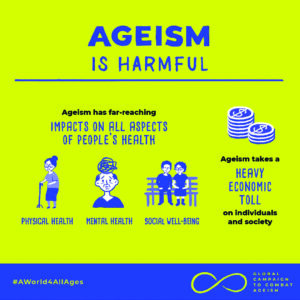 October is the month for chills and thrills. One thing that chills me is the damage caused to elder citizens by our culture’s casual dismissal of their worth. I wrote an article on this topic several years ago that was published in the Midland Daily News. I wish that I could say I have seen much change in the ensuing years, but sadly, examples still abound.
October is the month for chills and thrills. One thing that chills me is the damage caused to elder citizens by our culture’s casual dismissal of their worth. I wrote an article on this topic several years ago that was published in the Midland Daily News. I wish that I could say I have seen much change in the ensuing years, but sadly, examples still abound.
This month, I’d like to take a moment and reflect on that little word “still.” It’s not such a bad word in itself. In fact I used it in the last paragraph. It is the way it is applied when referring to older adults that can become problematic.
In one news interview with 74-year-old Tom Hayden on TV, the anchor’s introduction included this sentence: “…and Mr. Hayden is still active.” This is in reference to a person who was a major figure in civil rights activism in the sixties, served in the California State Assembly and State Senate, taught multiple college courses about political movements, and wrote numerous books. Or how about this headline from a newspaper in upstate New York: “Prize-winning poet still at work at age 86.”
The reality is that every time the media or public applies the word “still” in this manner, it is a way of infantilizing elders by expressing amazement that older adults maintain any interests or abilities at all. In reality, most elders I know lead rich, full lives. They are busy, curious, interested and compassionate. There simply is no reason to imply that it is surprising that this should “still” be so.
 The best writing I have seen on this subject comes from geriatrician Bill Thomas, author of What are Old People For? and Second Wind. According to Dr Thomas: “The word ‘still’ is intended as praise but actually serves to wound and diminish older people. The prominent place it holds in our lexicon, reminds us that, when it comes to people living in the latter decades of life, success is defined by the absence of ‘change, interruption, or cessation.’ It is a peculiar conception of human life that equates ‘success’ with a lack of change. Our use of the word ‘still’ reveals an ordinarily unstated assumption: In contemporary American society, any deviation from the parameters of vigorous adulthood, by definition, carries the stigma of failure.”
The best writing I have seen on this subject comes from geriatrician Bill Thomas, author of What are Old People For? and Second Wind. According to Dr Thomas: “The word ‘still’ is intended as praise but actually serves to wound and diminish older people. The prominent place it holds in our lexicon, reminds us that, when it comes to people living in the latter decades of life, success is defined by the absence of ‘change, interruption, or cessation.’ It is a peculiar conception of human life that equates ‘success’ with a lack of change. Our use of the word ‘still’ reveals an ordinarily unstated assumption: In contemporary American society, any deviation from the parameters of vigorous adulthood, by definition, carries the stigma of failure.”
“Healthy happy people are meant to grow and there are crucial moments in our lives when that growth compels us to leave one stage of the human lifecycle, and enter into the next. It is our culture’s inability to see the value of ‘life beyond adulthood’ that traps them in a desperate and ultimately doomed effort to continue living as adults. This is the tyranny of ‘still’.”
This month, I encourage you to pay attention. Notice when you hear derogatory language used towards older adults. It is only when we become aware, that we can then raise our voices and end the tyranny of “still.”
By Trena Winans, Education & Outreach Director

